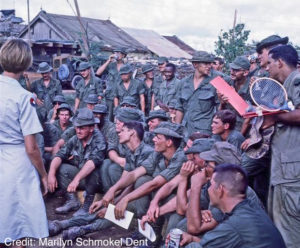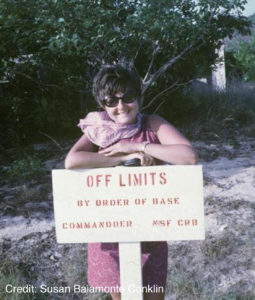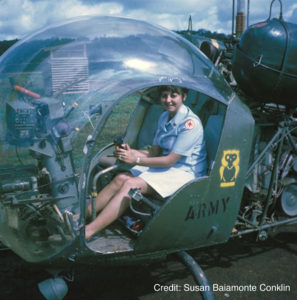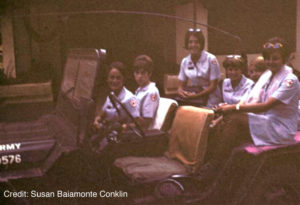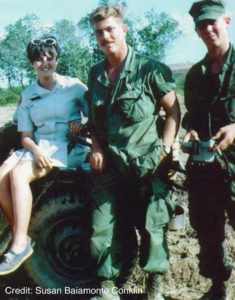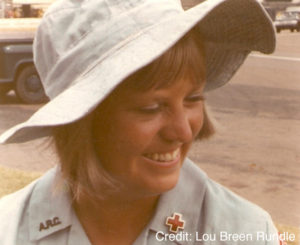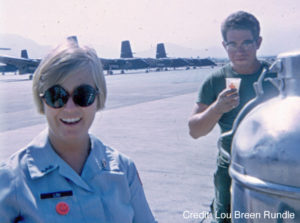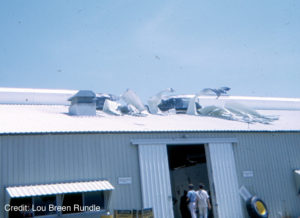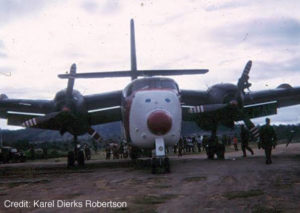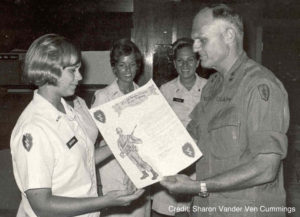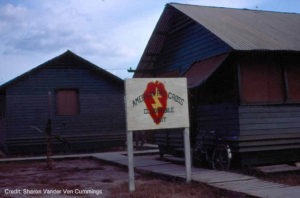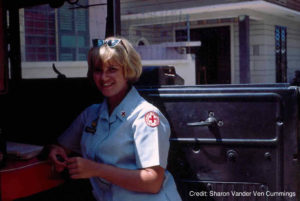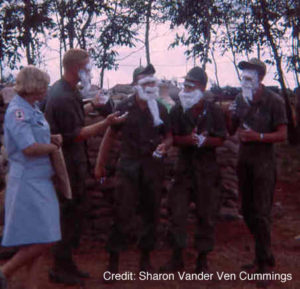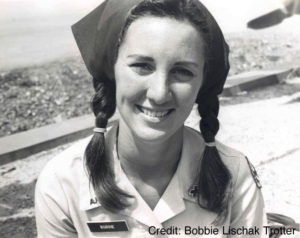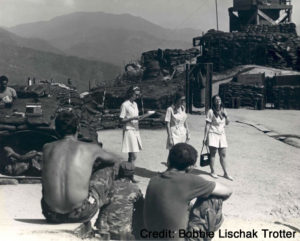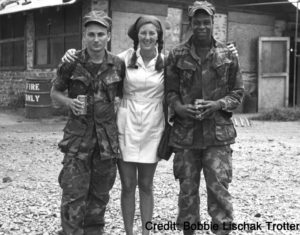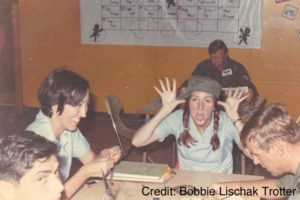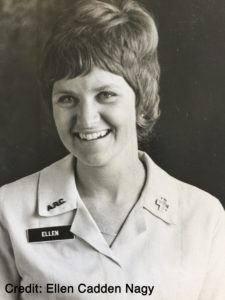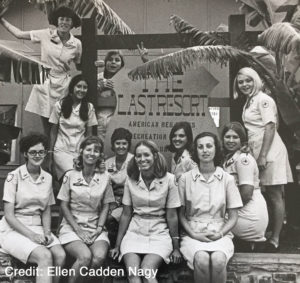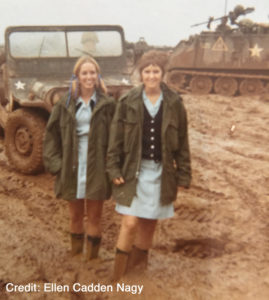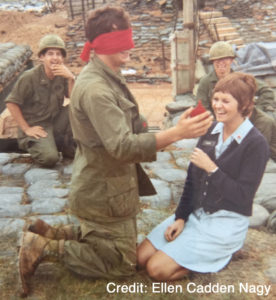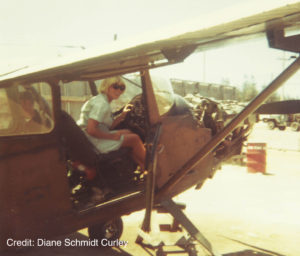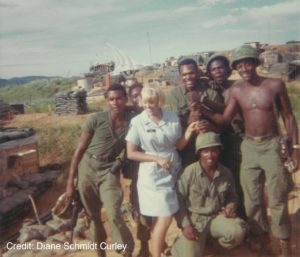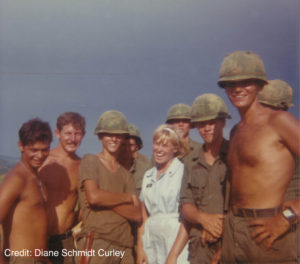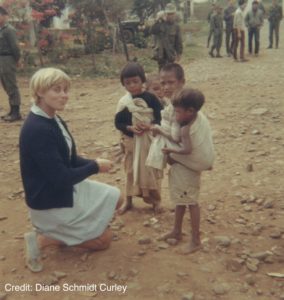In our eleventh edition of the Donut Dollie Detail, Maggie Connor Dutilly tells about her parent’s Red Cross work being one reason she choose to become a Donut Dollie, being in a fire-fight at Camp Viking, and being called up on stage by Bob Hope as a salute for the work the Donut Dollies did for our soldiers.
Please share the Donut Dollie Detail with family, friends and veterans you may know, and make sure to like/follow us on Facebook to learn when the next edition is posted. You can also share your email address with us at list@donutdollies.com for updates on the upcoming release of the Donut Dollies Documentary (we will not share/sell your email and will only use it for Donut Dollie related updates).
Please meet Red Cross Donut Dollie Maggie Connor Dutilly…
What prompted you to join the SRAO (Supplemental Recreation Activities Overseas) and want to go to Vietnam?
Both Parents had been involved with Red Cross work. My Mom (an R.N.) had been a Gray Lady at Valley Forge Army Hospital in Phoenixville, PA during WW II. My Dad had been a member of the War Production Board, so we (9 kids) grew up knowing service to the Country was a duty. Because of medical issues, none of my brothers could serve, but I had a sister who became a Navy Nurse. I think President Kennedy’s “Ask not…” speech affected my whole generation.
When and where were you stationed in Vietnam? Did you go by a nickname?
I was stationed in Danang from Aug. 1, 1971 until January 6, 1972 (with trips to Quang Tri and TDY to Bien Hoa) and Cam Ranh Army from Jan. 1972 until evacuation during the Easter Offensive in April 1972. I went by Maggie while in Nam.
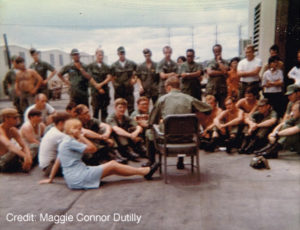 What was a routine day like in Vietnam?
What was a routine day like in Vietnam?
A routine day consisted of checking the Run schedule first thing to see whether I was assigned a Run or Recreation Center Duty. If a Run, I would climb into a ¾-ton truck with an assigned driver (Our Danang Run 1 Driver, Ronnie, eventually became my husband when our paths crossed 4 years after our time in Danang!) and another Donut Dollie (we always travelled in pairs) and go to the stops listed on the Run Schedule.
There were base Runs, where we would program in offices, maintenance bays, mess halls… wherever the Brass wanted us to gather with the guys.
There were forward Runs to firebases where we would fly out in a helicopter and would set up on top of bunkers, in artillery and mortar pits (when not in use, of course) and in mess halls if there was one on any particular firebase.
We would involve the GI’s in trivia, quiz games like Jeopardy and Concentration, and activities like water-balloon fights or Barber Call. Anything to get their minds off the war for a few minutes! Barber Call was when we would offer to give the GI’s shaves and hair-cuts (the First Sergeant would require the men to have standard hair-cuts and not show facial hair., even on firebases (I am thinking they would enforce that when things were slow to keep the troops busy.)
When I would participate in Barber-call, I would remove the blade from the razor I was using so I wouldn’t cut the GI!! Some of them didn’t really need a shave…they just wanted to be close to a Round-eye!
Our Programming lasted about 50 minutes, and we would repeat it on the base runs perhaps 8 times in a day at 8 different locations. (The Run Drivers were very important to us, for it was their job to get us to the right ‘next stop’ at the right time) and perhaps 3 or 4 times on each firebase.
If we were on a base at meal time, we would also man the serving line in the chow halls so we could greet the hungry GI’s as they came through for meals.
One day a week, I think it was Friday afternoons in Danang (In Cam Ranh the air base had their own Donut Dollie Unit) two of us would fill a big canteen with about 10 gallons of orange-ade and ICE, (a real treat in the tropics) load it on the tail-gate of an Air Force pick-up truck and head out to the flight-line at the air base. Hanging our feet off the back of the truck we would ride the flight-line, stopping at each hangar to visit with and dispense Short-timers’ Calendars to the mechanics who kept the Air Force planes running.
If we weren’t scheduled to travel, we would be assigned to the Center. There, we would play cards, shoot pool, play ping-pong, do art activities, join GI’s in the music room to play guitars, and, on special days like St. Patrick’s Day, would do program activities.
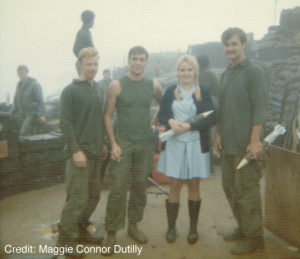 Did you ever have any “close calls” either on base or in any vehicles?
Did you ever have any “close calls” either on base or in any vehicles?
My second week ‘in-country’ my Unit Director, Pat, and I were caught in a fire-fight as we left Camp Viking …very scary…Turned out to be a sniper in the graveyard across from the Camp Gate…. we had to ride through exchange of pot-shots. No shots hit our truck… Lee (last name?) was driving… had a GI riding shotgun with a loaded M-16 in the truck back, as Pat and I rode nose to nose hunkered down on floor in the front seat.
It was that experience that made Lee decide we should learn how to drive the ¾ ton truck, so if that ever happened again, one of us could drive (we were not routinely permitted to drive any vehicle) while he joined the “shotgun” GI in protecting us.
On one firebase run, we landed right ahead of the General’s chopper, and, as was routine when the brass visited, a “practice red-alert” was started… What this usually meant was that, on a signal from the CO, x number of rounds of mortar and artillery were shot off. The problem that day was the when the rounds went out, one of the mortars doubled back and hit a bunker with GI’s in it. So the practice became a real thing! We quickly learned how to duck into the nearest bunker!
When the General’s chopper left with the wounded GI’s, the General called us into the TOC (Tactical Operations Center – a place we were NEVER permitted to enter for security reasons) and explained what had happened and how freaked out the whole firebase was at that “friendly fire” incident.
Then he said “You ladies have your work cut out for you today… Go out there and make those GI’s smile!”
It was one of the most difficult, yet rewarding days on my tour.
In Cam Ranh, our base had a ‘sapper-team’ come in at the start of the Easter Offensive of 1972… blew up some bunkers with GI’s in them… came through wire near the Minicourt we lived in. First time I heard outgoing artillery that wasn’t expected. (Had visited Artillery bases in Quang Tri so knew the sound…but wasn’t expecting it to wake us out of a sound sleep) Ended up we got evacuated to Cam Ranh Air Base… then they got hit… so went to Saigon and they started getting shelled!
Were you ever injured while in Vietnam?
Second week in country, a couple of days after the fire-fight I got a chance to go out to Spanish Beach on a day off with some GI’s from the radio station on Monkey Mountain… to an area known as “THE ROCKS”. As I was climbing down rocks, I slipped and cut my knee… Went to the dispensary on Camp Horn, where the medic dressed the wound… told me to come back the next day, gave me some crutches… went back, for several days, and noticed each time I went in there were more GI’s in “sick-call”… I wondered if they just wanted to see a “round-eye” getting her dressing changed… finally, when the gash wasn’t healing, I stopped into the Gunfighter Hospital on the Air Base and the Flight Surgeon took one look at the wound and said “It’ll never heal if they keep putting all that gunk on it”, so he ordered me into a cast for 10 days to, as he put it, “ keep the Army guys away from it so it would heal!”
Cast came off, and two weeks later I tripped down some steps on an Air Base run, sprained my ankle and had to go back to the same Flight Surgeon and same cast man and have a plaster splint on my other leg for 10 days!
When I went to the O club at XXIV Corps Headquarters, Camp Horn, (where we lived) for dinner that night, having missed chow-hall, I got a standing Ovation for my clumsiness!
What was it like to visit the soldiers in the hospitals?
Before going to Nam, I had been a Gray Lady at Valley Forge Army Hospital like my Mom had been years before, so I was familiar with hospital visits… The strange thing for me was seeing the GI’s straight out of the field… pretty challenging to deal with.
One day as we arrived at 95th Evac. we heard small arms fire. When we got to the door into the Red Cross Office, a stretcher with a body in a body bag was rolled past us to the ER…. Seems a GI had gotten orders back to the field after some weeks in the hospital and didn’t want to face going back out… so he talked a guard into taking a break for a smoke, and while the guard was away from his post, the patient took the guard’s gun and shot himself. THAT was a bad day!
How was the transition returning home to the United States?
My sister, the Navy Nurse, lived in California so when I returned to the states she talked me into staying with her a couple of weeks to ‘adjust’… I see now, having had a son go off to war, that I probably should have gone home to Pennsylvania, to my parents… but I didn’t want them to see the mess I was. I was dealing with a LOT of PTSD… in fact, until the LORD healed me several years later, I was a mess for several years.
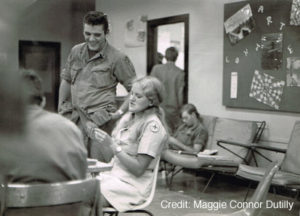 What would you like people to remember and understand most about the women who served?
What would you like people to remember and understand most about the women who served?
We were a patriotic group… we saw our classmates, brothers, cousins, neighbors getting drafted, and we wanted to do our part. There weren’t a lot of opportunities for women to show their support for our troops.
The women who were nurses got the worst of the war… Our job was on the other side of the bed… we were blessed that we could make a difference!
How do you feel Veterans think of your time having served with them? Have any Veterans expressed their feelings to you directly?
I have had some very positive interactions with Vets in the past few years… One local group has invited me to be part of their Honor Guard at Memorial Day Ceremonies each year, and a local Vets group invited me to visit them for their monthly meeting… when I was introduced as a DONUT DOLLIE, I got a standing ovation. THAT meant a LOT!!
What were your fondest or most interesting memories of your time serving in Vietnam?
Fondest memories…. The whole tour!
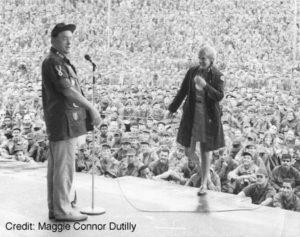 Special:
Special:
#1 Being called up onstage at the Bob Hope show so he could salute the work we were doing.
#2 Meeting Sammy Davis Jr. when he performed in Cam Ranh. (For security, the Vietnamese ladies who did the laundry were not allowed on base, so our Unit was asked if we would consider ironing for the performers. Some of the DD’s were insulted, but I thought it would be fun! And it was!)
#3 Meeting my husband… and all the wonderful guys I knew over there.
PLEASE NOTE: THERE ARE 10 PREVIOUS EDITIONS OF THE DONUT DOLLIE DETAIL THAT CAN BE SEEN HERE, JUST SCROLL DOWN TO READ EACH (AT THE BOTTOM, YOU’LL SEE A LINK TO GO TO THE NEXT PAGE OF DONUT DOLLIE DETAIL FEATURES)

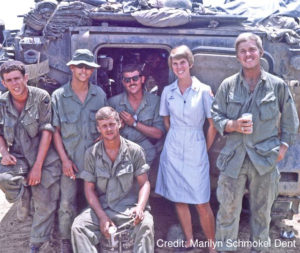 When and where were you stationed in Vietnam? Did you go by a nickname?
When and where were you stationed in Vietnam? Did you go by a nickname?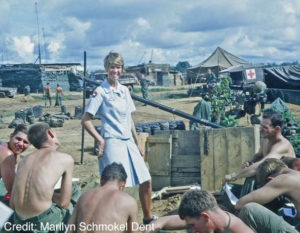 What was a routine day like in Vietnam?
What was a routine day like in Vietnam?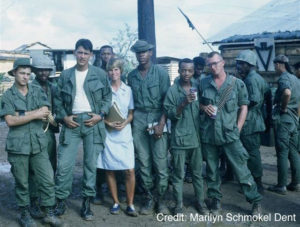 What are your fondest or most interesting memories of your time serving in Vietnam?
What are your fondest or most interesting memories of your time serving in Vietnam?
